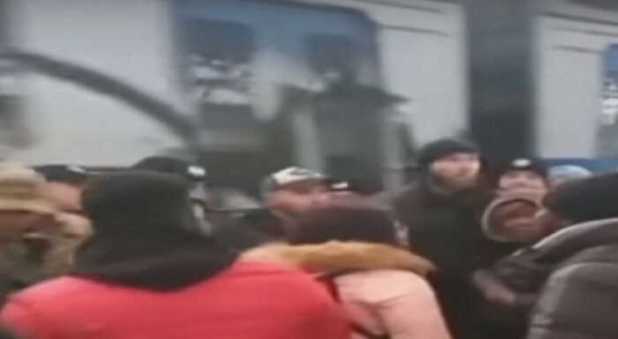
New Delhi, March 4 : Hundreds of African and Indian students among others trying to flee Ukraine are facing racism and discrimination both within the country and at its borders with neighbouring countries, Poland in particular, media reports say. Several students who were pursuing educational courses in Ukraine complained that the guards at the frontier near Poland would push them out of serpentine queues when their turn came to cross and brazenly gave preference to Ukrainians. The colour discrimination was also evident at railway stations in Kyiv and other places, the reports said. Barlaney Mufaro Gurure, a space engineering student from Zimbabwe, had stood in queue at Ukraine’s western border crossing Krakovets after an exhausting four-day trip. But when her turn came to cross after nine hours of patient waiting, the border guard pushed aside her and four other African students, giving priority to Ukrainians, Al Jazeera reported. It took hours, and relentless demands, before they were also allowed to go through border control. “We felt treated like animals,” the 19-year-old said from a Warsaw hotel. Gurure is a freshman at the National Aviation versity in Kyiv and fled hours after the Russian military invasion started. Al Jazeera said her story was not isolated. Scores of Africans have reported episodes of abuse and discrimination. Some African students alleged that they have been waiting for days to cross amid freezing temperatures, with no food, blankets or shelters. Claire Moor, another Black student, was pushed down as she tried to board a train at Lviv’s train station. The guard insisted that only women could take the train. “The officer looked away, Moor said, as she pointed out that she was, indeed, a woman,” she said. “I was shocked because I did not know the extent of the racism,” Al Jazeera quoted as saying. Jan Moss, a volunteer with the Polish aid group Grupa Zagranica, who has been providing assistance at the Polish-Ukrainian border, admitted that the reception near Medyka has been more problematic as refugees were being given “racial profiling”. Ukrainians and Polish nationals were being allowed to pass through the much quicker vehicles’ lane, while foreigners have to go through the pedestrian one, a three-stage process which can last 14 to 50 hours, Moss said. Al Jazeera contacted Ukraine’s Border Guard Service via email over allegations of segregation at the borders but did not receive a response. The African on said: “Reports that Africans are singled out for unacceptable dissimilar treatment would be shockingly racist and in breach of international law.” South Africa’s Foreign Ministry said that a group of its nationals and other Africans were being “treated badly” at the Polish-Ukrainian border. Nigeria also expressed concerns over reports of discriminatory behaviour, including a video widely shared on social media showing a Nigerian woman with her young baby being forcibly made to give up her seat to another person. But some foreigners said they received a warm welcome in countries such as Moldova and Romania. At the border with Poland, Congolese student Madi Kemel Dinga told Al Jazeera: “We were the last people to get on anything… They will first put their people first. And then us. For me, it was discriminating but for them, it is normal.” Added Ronald Mangu Achu, a student from Cameroon: “We understand that they need to save their citizens but we have been loyal to Ukraine. We have been in their country lawfully… I believe the least they could do is evacuate us.” The Nigerian presidency said: “There have been unfortunate reports of Ukrainian police and security personnel refusing to allow Nigerians to board buses and trains heading towards the Ukraine-Poland border.” The numbers fleeing the Russian invasion of Ukraine has surged to more than half a million. Russian President Vladimir Putin has accused Ukrainian security forces of holding Indians as well as other foreigners as hostage. Moroccan pharmacy student Ayoub, 25, who was studying in Kharkiv, said he and other non-white international students were stopped by Ukrainian guards from leaving the country. “They wanted Ukrainians to go first, so it was white people who got priority,” he told Al Jazeera. “On one of the ‘checkpoints’ on the approach to the Polish border I was pushed back and told to wait.” Al Jazeera said students from countries such as India, Nigeria and Morocco have helped to make Kharkiv a vibrant versity city and their fees have contributed to the local economy. Some students said their schools did not offer them assistance to leave the country. “My friends went to the Polish border and were treated awfully by the Ukrainian guards. It wasn’t just Black people like me; it was anyone who wasn’t white,” an African student said. Rubi, a 35-year-old international student from India, returned for offline classes to Kyiv only last month. She left all her belongings in her new apartment and escaped the city with 25 Indian and Bangladeshi friends. She said they have not received any help. “Everything is free for Ukrainians only. But we are also part of Ukraine,” she said. “One person at the border told us that we cannot cross. Imagine, we walked 30 km and the man is saying something like this. We couldn’t get any transportation, we don’t have any accommodation, no one is there to help us.” Anna Alboth from Minority Rights Group confirmed the racial discrimination. “Discrimination mostly takes place on the Ukrainian side of the border… We receive messages from Nigerian and Indian students who could not handle the fact that they are treated differently and returned to Lviv,” she said. MR RNJ

